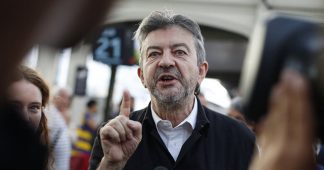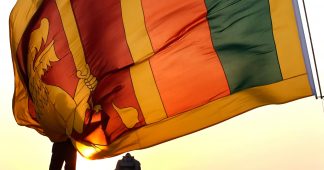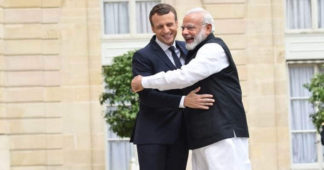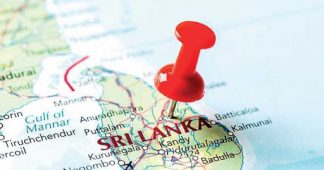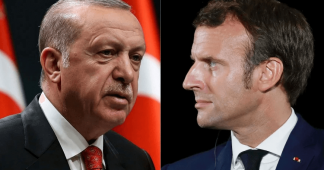By Lasanda Kurukulasuriya
August 30, 2023
French President Emmanuel Macron visited Colombo late July, after a tour of Pacific island states. From 24 – 28 July he visited New Caledonia, Vanuatu and Papua New Guinea (PNG) – the first a French colony, the second a former possession.
The French Embassy described Macron’s brief stop in Colombo on 29 July as “an historic visit as it marks the first-ever visit by a French president to Sri Lanka and also the two countries celebrate 75 years of diplomatic ties this year.” His tour of the Pacific islands too was similarly tagged as ‘historic’ in some media. It’s notable that Macron’s Pacific tour coincided with travel to the same region by some top US officials, including US Secretary of State Antony Blinken, to Tonga, and Defense Secretary Lloyd Austin to PNG. A closer look at the coincidental diplomatic activity in the Pacific (Oceania) may throw some light on what’s really historic about it, or rather, about what it signals.
Macron’s tweet posted on the website of the French Embassy said “Sri Lanka and France are two Indian Ocean nations that share a common goal: an open, inclusive and prosperous Indo Pacific.” What is the basis for the French president’s assertion that “Sri Lanka and France are two Indian Ocean nations?” After all, France is thousands of kilometres away from Sri Lanka. It is the French colonial territory of Reunion (population 982,574), an island in the Indian Ocean east of Madagascar.
In talks with President Ranil Wickremesinghe, President Macron pledged assistance to the country in its economic recovery process, and expressed interest in collaborating with Sri Lanka during its upcoming chairmanship of the Indian Ocean Rim Association (IORA), of which France is a member, the President’s Media Division in Colombo said. France has become a “fully-fledged member” of the Indian Ocean Rim Association (IORA) “because of La Réunion,” according to the French Ministry for Europe and Foreign Affairs.
Overseas territories
It’s relevant to note that France has an enormous Extended Economic Zone (EEZ) on account of its overseas territories in the Pacific. They represent 6.9 million square km out of France’s total EEZ of 10.9 million square km, according to an analysis posted online by the Observer Research Foundation. “Macron wants to convince regional countries that France is not an outsider but part of the region, as France has overseas territories there,” wrote Ravindra Singh Prasad of InDepth News, citing a comment in Global Times by Cui Hongjian of the China Institute of International Studies. “But the validity of France’s status in the region is, in fact, thin, as its territories there were obtained through colonialism, which is difficult for Macron to rationalise,” Cui reportedly said. In a region where geopolitical tensions between the US and China are intensifying, analysts speculate that Macron seeks to project a Pacific strategy distinct from that of the US and its western allies. This is against a backdrop of French displeasure with the US and UK, who together recently upstaged France over a submarine deal with Australia.
Visiting the former French colony of Vanuatu on 27 July Macron made a speech referring to the appearance of a ‘new imperialism’ in the region – an oblique but unmistakable reference to China. “There is in the Indo-Pacific, and particularly in Oceania, new imperialism appearing, and a power logic that is threatening the sovereignty of several states; the smallest, often the most fragile,” Macron is reported as saying. “Our Indo-Pacific strategy is above all to defend through partnerships the independence and sovereignty of all states in the region that are ready to work with us.”
There is high irony in his claim. Even as he spoke, in West Africa a military coup was unfolding in Niger where thousands of protesters, who appeared to support the coup leaders, took to the streets demanding that the French leave Niger. “While a protest in defense of (deposed leader Mohamed) Bazoum’s government quickly fizzled out, the pro-coup demonstrations continue to gain in strength as protesters count on the military junta to follow Mali and Burkina Faso in demanding the withdrawal of French and other western troops” wrote Pavan Kulkarni, a writer for People’s Dispatch. Speaking in PNG on 28 July Macron denounced the coup as ‘completely illegitimate’ and pledged to support the Economic Community of West African States (ECOWAS) in its decisions against the coup leaders.
Niger is rich in natural resources including uranium, gold and oil, but remains one of the poorest countries in the world. The uranium industry is reportedly controlled by a company in which France has an 85% stake, and Niger just 15%. “One in three lightbulbs in France are powered by uranium from Niger, at the same time as 42% of the African country’s population lived below the poverty line. The people of Niger have watched their wealth slip through their fingers for decades” wrote Vijay Prashad and Kambale Musavuli in Defend Democracy Press.
Mali and Burkina Faso have taken the position that if the threatened military intervention in Niger is launched by the regional bloc ECOWAS, they would consider it a declaration of war against them. Guinea, in separate statement, indicated it would not apply the sanctions which, by all accounts, could cripple Niger’s economy as they block land and air borders to the landlocked state. Earlier, Nigeria cut off power supply to Niger, which depends on its neighbour for 70% of its electricity.
US in the Pacific
While Macron visited the Pacific Islands and Sri Lanka, US Secretary of State Antony Blinken was meanwhile in Tonga, ahead of travel to New Zealand and Australia. This was two months after he had visited Papua New Guinea to sign a US Defense Cooperation Agreement with that country. In PNG Blinken stood in for President Joe Biden who cancelled, reportedly to focus on debt talks in Washington. Had he gone, he would have been the first sitting US president to visit a Pacific island nation.
Responding to journalist’s question at a joint press conference with Tonga’s prime minister, as to whether his visit was “more of a US agenda and less what Tonga wants from the US,” Blinken said “The simple reality is this. We’re a Pacific nation.” And went on to elaborate on partnerships the US sought to build with countries throughout the Pacific. Blinken’s assertion – reminiscent of Macron’s tweet – begs the question as to why visiting VVIPs feel a need to assert ‘belonging’ in distant regions.
A recap of events over the past 16 months would help at this point. In April 2022 the Solomon Islands signed a security pact with China that set off alarm bells in the West. Australia’s ABC News at the time reported that “The federal government has declared it is “deeply disappointed” that Solomon Islands has pressed ahead and signed a security pact with China – a deal Australia, New Zealand and the US fear could open the door to a Chinese naval base in the South Pacific.” All three had sought to dissuade Prime Minister Manasseh Sogavare from going ahead with it. The prime minister had earlier said “There is no intention to ask China to build a military base in Solomon Islands. We are insulted by such unfounded stories.”
Diplomatic events that followed this development, included the following:
- February 2023: The US opened an embassy in the Solomon Islands
- May 2023: The US opened an embassy in Tonga
- May 2023: The US and Papua New Guinea signed a Defense Cooperation Agreement.
- July 2023: France opened an embassy in Samoa
- 24 – 29 July 2023: French President Emmanuel Macron toured New Caledonia, Vanuatu and PNG, and briefly met President Ranil Wickremesinghe in Sri Lanka
- 26 – 29 July 2023: US Secretary of State Blinken travelled to Tonga, New Zealand and Australia. In Tonga, responding to journalists’ questions he mentioned that the US was looking to open new embassies in Vanuatu and Kiribati. With reference to China’s engagement in the region he spoke of ‘problematic behaviour’ and ‘predatory economic activities.’
- 26 July 2023: US Defense Secretary Lloyd Austin visited PNG to discuss deepening security ties with Prime Minister James Marape and PNG Defense Council members.
These events shed light on the bigger picture. What’s historic about the high profile visitors’ recent travels in the region is not that they are ‘firsts,’ but that they signal a tectonic shift to the Asia-Pacific as a geopolitical battlefield, caused by China’s rising global influence. Reverberations may also be seen in the trilateral security agreement between the US, Japan and South Korea, announced at their August 18 summit at Camp David in the US.
We remind our readers that publication of articles on our site does not mean that we agree with what is written. Our policy is to publish anything which we consider of interest, so as to assist our readers in forming their opinions. Sometimes we even publish articles with which we totally disagree, since we believe it is important for our readers to be informed on as wide a spectrum of views as possible.
